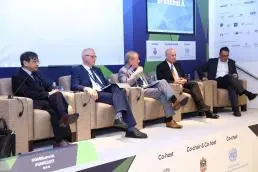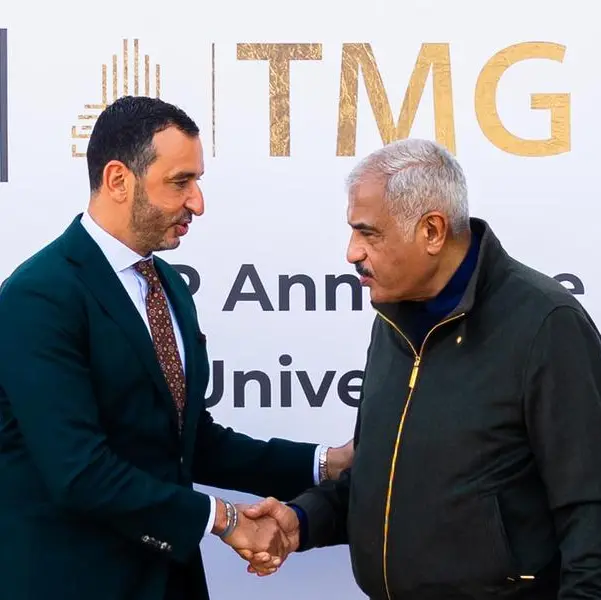PHOTO
No downturn in sight for the aerospace industry amidst increasing demand
Biofuels are being explored, but are not commercially feasible in a time of low oil prices
Automation can help aircraft manufacturers to cut corners in order to keep pace with demand
Abu Dhabi, UAE, March 30 2017: As a major contributor to global Gross Domestic Product (GDP) – international air transport alone contributes US$2.7 trillion – the aerospace industry has enjoyed a sustained peak, driven by continued market demand. In a panel at the Global Manufacturing and Industrialisation Summit (GMIS), aerospace leaders discussed the future of an industry that supports 10 million people globally through direct employment, with an additional 63.5 million supported indirectly.
The panel was composed of Jan Pie, Secretary General, Aerospace and Defence Industries Association of Europe (ASD), and Chairman Elect, International Coordinating Council of Aerospace Industries Associations (ICCAIA); Michel Peters, CEO, NLR (Netherlands Aerospace Centre); Robert S. Harward, Vice Admiral USN (Ret) SEAL and Chief Executive – UAE, Lockheed Martin International, and Tetsuro Hisano, Vice President and General Manager of Commercial Airplane Programs Management Office, Mitsubishi Heavy Industries. Axel Threlfall, Editor-at-Large, Reuters, moderated the conversation.
While the outlook is rosy, there are still a number of challenges in the aerospace industry that need to be addressed – such as market demand growing at 45 per cent on an annual basis. There are around 17,000 aircraft currently flying with a capacity of at least 100 passengers or capable of carrying 10 tonnes of goods or more. In 20 years time, there will need to be around 30,000 aircraft available – and, according to Jan Pie, a number of the existing aircraft will no longer be in operation in 20 years, even with upgrades.
“If we look backwards over the past few decades, or even the last century, this has been an industry that has seen a remarkable growth,” said Pie. “As we speak the order books are full for the two largest aircraft manufacturers, Boeing and Airbus, for the coming ten years. We can talk about the market’s next upturn, but we don’t yet know when the downturn will come.”
Michel Peters, speaking about the capacity requirements on original equipment manufacturers (OEMs), said: “To meet the demand of 30,000 aircraft in the next 20 years, the big OEMs, such as Boeing and Airbus, have to turn out approximately 60 aircraft a month. That’s nothing special for an automotive manufacturer, but 60 aircraft a month is really something. That means that lot of technology will be used, adapted from car manufacturers. Phasing manufacturing automation together with the design of the aircraft itself can cut some corners, whilst keeping up with the safety and quality standards.”
Other key issues the industry faces include safety, even though air travel today is safer than ever; connectivity, in terms of connecting all aspects of air travel – including aircraft, passengers, ground services and more; the introduction of pilotless drones to the market, and the total integration of drones into the environment without compromising on safety. Fuel, too, is a matter that the industry is looking at, given fluctuating prices of oil and further research into green alternatives.
There are people looking at green fuel substitutes, according to Tetsuro Hisano. “We have lots of very innovative companies that are looking at, for example, using sunshine to create fuel from forms of bacteria, and harnessing the energy produced to create oil. It is not yet commercially feasible. When oil prices are at $100 per barrel, then these ideas become more feasible, but in these days, when fuel goes down below $50 per barrel, it is less feasible … so oil price drives innovation in this field.”
“In our profession, the military drives technology,” said Robert S. Harward, speaking on the influence of Fourth Industrial Revolution (4IR) technologies on aerospace, and referencing the push of the USA Chief of Naval Operations, Adm. John Richardson, to transform Navy fleets to be completely driven by biofuels. “That’s what forced industry to respond. I think those sorts of requirements then help drive the change quicker than industry would do it on its own.” On the matter of 4IR and the potential for job loss, Harward said that “technology puts people first; people stay ahead of the artificial intelligence curve.”
The inaugural Global Manufacturing and Industrialisation Summit is being held at the Paris-Sorbonne Abu Dhabi University, UAE, until March 30, 2017. A joint initiative by the UAE Ministry of Economy and the United Nations Industrial Development Organization (UNIDO), and co-hosted with the Abu Dhabi Department of Economic Development, the Summit is held under the patronage of His Highness Sheikh Mohamed bin Zayed Al Nahyan, Crown Prince of Abu Dhabi and Deputy Supreme Commander of the UAE Armed Forces. The Summit is the world’s first global gathering for the manufacturing community, bringing together decision-making leaders from governments, businesses and civil society organisations to shape a vision for the sector’s future.
The Summit is a global platform for participating attendees to learn from best practices from across the world. This unprecedented global gathering will spark new ideas and set the stage for debate and action – addressing ways in which manufacturing can shape and reshape the world, integrating activities between developed and emerging markets, and delivering on social responsibility towards future generations. Leaders from the public and private sectors, along with representatives from civil society organisations, will gather to discuss global challenges within the manufacturing sector, looking specifically at six themes: technology and innovation; global value chains; skills, employment and education; sustainability and environment;
About the Global Manufacturing and Industrialisation Summit
As the world’s first cross-industry forum, the Global Manufacturing and Industrialisation Summit is a global gathering for manufacturing minds. It is a voice and a venue for global manufacturing transformation. More than 1,200 delegates will attend, including world leaders, industry CEOs, policy-makers, specialist researchers and academics. The Global Manufacturing and Industralisation Summit will deliver (i) a voice for transformational ideas, (ii) a venue for the generation of new networks and cross-industry partnerships, (iii) a showcase for pilot projects arising from cross-industry research,
Global Agenda on the Future of Manufacturing
The conference will focus on the role of manufacturing in reconstructing the global economy and restoring global prosperity. Leaders from the public and private sectors, along with civil society representatives, will gather together to discuss global challenges facing the manufacturing sector. The discussions will focus around six themes: technology and innovation; global value chains; skills, employment and education; sustainability and environment; infrastructure; standards and stakeholder alignment. The participants will form working groups to identify concrete action plans and recommendations that outline potential solutions to global issues, as well as showcase best practices and case studies from across the world. To highlight an example of global issues, the inaugural conference will focus on the issue of economic migration, with the aim of establishing a manufacturing platform that will bring together countries facing emigration or immigration challenges with regional countries that seek to support economic reconstruction. These countries will work together with manufacturers and the wider United Nations network on restoring global prosperity.
The Manufacturing Expo
Capitalising on the huge presence of the global manufacturing community under a single meeting venue, the Manufacturing Exhibition will offer space to corporations looking to showcase their products, services and latest innovations or technologies that can further contribute to promoting global economic development. The Manufacturing Expo consists of four components: an exhibition showcasing the manufacturing capabilities of the host country; international pavilions showcasing the manufacturing capabilities and economic incentives of each participating country; an innovation exhibition that demonstrates the latest fourth industrial revolution technologies; and an event for SMEs to present their products and solutions to potential customers.
The Global Value Chain Market
The Global Value Chain Market (GVCM) is a business matchmaking platform dedicated to increasing regional and international partnerships and opportunities. The platform will provide networking and sourcing opportunities both online and onsite via pre-scheduled meetings with the vision of forging investment opportunities, commercial partnerships, and encouraging technological transfer and knowhow. The platform will enable countries to identify and meet global manufacturers to promote industrial development, and familiarise global manufacturers with targeted industrial activities in various countries. The GVCM will become a source of valuable information for global investments, providing insights on legislation and regulations, sovereign risk, political stability, and physical and logistical infrastructure.
© Press Release 2017




















